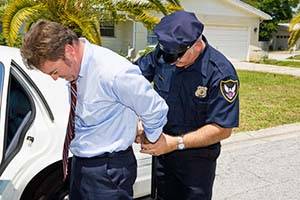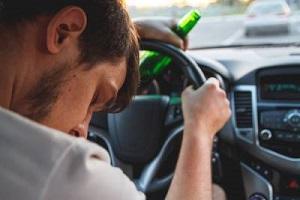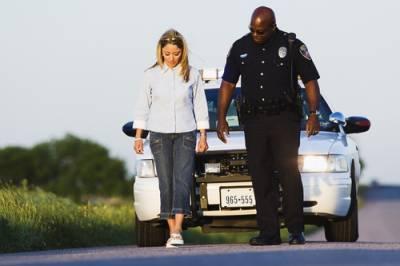Recent Blog Posts
Illegal Traffic Stop Can Sink DWI Charge
 Police officers must follow several legal steps when arresting you on suspicion of driving while intoxicated. A mistake at any point in the process can result in the DWI charges being dropped. For instance, a police officer must have a legal reason to stop you leading up to your DWI arrest. If the officer performs an illegal stop, evidence of your alleged DWI may be inadmissible in court, including blood alcohol content and field sobriety tests. Without this key evidence, you can petition to have your DWI charge dismissed.
Police officers must follow several legal steps when arresting you on suspicion of driving while intoxicated. A mistake at any point in the process can result in the DWI charges being dropped. For instance, a police officer must have a legal reason to stop you leading up to your DWI arrest. If the officer performs an illegal stop, evidence of your alleged DWI may be inadmissible in court, including blood alcohol content and field sobriety tests. Without this key evidence, you can petition to have your DWI charge dismissed.
Reasonable Suspicion
Because most DWI arrests do not involve warrants, a police officer must have some cause to pull over a driver. Unfortunately for DWI defendants, Texas allows DWI traffic stops based on the broadly defined standard of reasonable suspicion. Unlike probable cause, reasonable suspicion only requires that an officer have some reason to believe that the driver committed a traffic violation or was driving dangerously. The officer can be mistaken but still justified in performing the stop if it was based on a reasonable belief. Valid reasons for DWI traffic stops include:
How Video Evidence Can Help Your DWI Case
 Police video of your arrest on suspicion of driving while intoxicated has the potential to help or hurt your defense case. A recent and famous example is the video released of Tiger Woods’ arrest. The video portrayed him as being confused as police officers questioned him and administered field sobriety tests. The tape made him look guilty in the court of public opinion. Regardless of its contents, it is vital for your defense to see any video of your DWI arrest. An experienced DWI defense attorney can find useful evidence in an arrest video that a normal person would not think to look for.
Police video of your arrest on suspicion of driving while intoxicated has the potential to help or hurt your defense case. A recent and famous example is the video released of Tiger Woods’ arrest. The video portrayed him as being confused as police officers questioned him and administered field sobriety tests. The tape made him look guilty in the court of public opinion. Regardless of its contents, it is vital for your defense to see any video of your DWI arrest. An experienced DWI defense attorney can find useful evidence in an arrest video that a normal person would not think to look for.
Accessing Video Evidence
Police departments commonly install dashboard cameras in their vehicles to record arrests. The prosecution can use the video footage to support the charges brought against you in a DWI case. Your defense also has a right of discovery that allows it access to evidence the prosecution has against you. Upon your request, the prosecution must provide you with a copy of the arrest video. Failure to comply may result in your case being dismissed. However, the prosecution is only required to turn over the video evidence if your defense makes a formal request.
Beware Boating While Intoxicated Charges
 The summer can be the height of recreational boating season in Texas, particularly during holidays such as the Fourth of July. Police are aware of this and will be on the lookout for people who have had too much to drink. Boating While Intoxicated is just as serious a charge in Texas as Driving While Intoxicated. People accused of BWI must take the same measures to protect themselves as if they were stopped for a DWI.
The summer can be the height of recreational boating season in Texas, particularly during holidays such as the Fourth of July. Police are aware of this and will be on the lookout for people who have had too much to drink. Boating While Intoxicated is just as serious a charge in Texas as Driving While Intoxicated. People accused of BWI must take the same measures to protect themselves as if they were stopped for a DWI.
Defining Boating While Intoxicated
BWI occurs when a person operating any motorized aquatic vehicle is legally intoxicated, which is defined as having a blood-alcohol content of 0.08 or greater. Just as with a DWI, the punishment for those convicted varies, depending on the offender’s history and aggravating factors:
- A first-time BWI offense with no aggravating factors is a class B misdemeanor, with a sentence as long as 180 days in jail and a fine as large as $2,000;
Texas Close to Passing Second Chance Law for DWI Offenders
 A conviction of driving while intoxicated in Texas has consequences beyond the court-issued punishment. The conviction will show up on your criminal record when someone conducts a background check on you. A DWI record could prevent you from getting a new job, bank loan or lease on an apartment. Proposed Texas legislation would allow one-time offenders to seal their DWI records. The “Second Chance Bill” has passed the Texas House of Representatives and Senate and is awaiting Gov. Greg Abbott’s approval. The bill has received bipartisan support, based on the idea that an isolated DWI incident should not punish a person for the rest of his or her life.
A conviction of driving while intoxicated in Texas has consequences beyond the court-issued punishment. The conviction will show up on your criminal record when someone conducts a background check on you. A DWI record could prevent you from getting a new job, bank loan or lease on an apartment. Proposed Texas legislation would allow one-time offenders to seal their DWI records. The “Second Chance Bill” has passed the Texas House of Representatives and Senate and is awaiting Gov. Greg Abbott’s approval. The bill has received bipartisan support, based on the idea that an isolated DWI incident should not punish a person for the rest of his or her life.
How It Works
The bill would amend the Texas code regarding the nondisclosure of non-violent class C misdemeanors and DWI convictions with a blood alcohol content level of less than 0.15. Texas passed a similar bill in 2015 that applied to non-violent class A and B misdemeanors. A person could petition a court to seal the record of his or her DWI conviction in Texas, as long as:
New Program May Expedite Blood Search Warrants During DWI Arrests
 If you have been charged with driving while intoxicated, you can refuse to submit to a blood alcohol test. In Texas, police officers can request a blood search warrant that requires a sample of your blood to be drawn and tested for alcohol or other intoxicating substances. Executing the warrant can take hours because the officer often needs to go to the station or court house to obtain it. However, some Texas municipalities are testing a mobile communications program that enables officers to receive an approved blood search warrant in the field. If the program is successful, it may become easier for law enforcement to obtain evidence against DWI suspects.
If you have been charged with driving while intoxicated, you can refuse to submit to a blood alcohol test. In Texas, police officers can request a blood search warrant that requires a sample of your blood to be drawn and tested for alcohol or other intoxicating substances. Executing the warrant can take hours because the officer often needs to go to the station or court house to obtain it. However, some Texas municipalities are testing a mobile communications program that enables officers to receive an approved blood search warrant in the field. If the program is successful, it may become easier for law enforcement to obtain evidence against DWI suspects.
Blood Search Warrant
Under Texas law, a judge can issue a blood search warrant that allows a medical professional to collect a DWI suspect’s blood sample as possible evidence of intoxication. An officer can request a blood search warrant as long as:
The Three Standard Field Sobriety Tests
 Texas motorists can refuse to take a field sobriety test when police officers pull them over on suspicion of driving while intoxicated. Officers use the test to determine if motorists have any physical or mental impairments, and the test results can be evidence in DWI cases. There is no penalty for refusing a field sobriety test, but the driver may still be arrested if the officer believes there are other signs of DWI. If the case goes to trial, prosecutors may claim that refusing the test is evidence of guilt.
Texas motorists can refuse to take a field sobriety test when police officers pull them over on suspicion of driving while intoxicated. Officers use the test to determine if motorists have any physical or mental impairments, and the test results can be evidence in DWI cases. There is no penalty for refusing a field sobriety test, but the driver may still be arrested if the officer believes there are other signs of DWI. If the case goes to trial, prosecutors may claim that refusing the test is evidence of guilt.
Whether you are sober or not, you are taking a risk if you agree to a field sobriety test. You may perform poorly during the test due to factors other than sobriety, such as the surrounding environment or a natural lack of balance. Your test performance can be considered evidence that you were impaired, even if your blood alcohol content was below the legal limit. The National Highway Safety Administration has three standard sobriety tests.
DWI Offender Wins Appeal Against State of Texas
 A Texas appellate court recently ruled in favor of a man who argued that the state punished him for having multiple driving while intoxicated convictions without proving his previous conviction. In Oliva v. The State of Texas, the appeals court overturned a lower court decision to convict the defendant of a Class A misdemeanor for DWI, saying it should have been a Class B misdemeanor conviction. According to Texas law:
A Texas appellate court recently ruled in favor of a man who argued that the state punished him for having multiple driving while intoxicated convictions without proving his previous conviction. In Oliva v. The State of Texas, the appeals court overturned a lower court decision to convict the defendant of a Class A misdemeanor for DWI, saying it should have been a Class B misdemeanor conviction. According to Texas law:
- A first-time DWI offense is a Class B misdemeanor, punishable by up to six months in prison and a maximum fine of $2,000.
- A second-time DWI offense is a Class A misdemeanor, punishable by up to a year in prison and a maximum fine of $4,000.
The case addressed how a prior DWI conviction must be presented when a subsequent DWI charge is made.
Case Details
According to the written decision, police had charged the defendant with a DWI in May 2015, while also alleging he had a previous DWI conviction. The defendant pled not guilty, and the case went to trial. During the trial, prosecutors did not attempt to prove or show evidence of the defendant’s previous conviction. After the jury found the defendant guilty of the May 2015 charge, prosecutors presented the evidence of the previous DWI conviction during the punishment hearing. Because of the new evidence, the defendant was convicted of a Class A misdemeanor. The defendant appealed the decision, saying that the state had not proven his previous DWI conviction during the trial.
How Ignition Interlock Devices Work in Texas
 Since 2015, Texas law has required many people convicted of driving while intoxicated to use ignition interlock devices on their vehicles as a condition of restoring their driving privileges. The new program is meant to reduce incidents of intoxicated driving by previous offenders and provide some first-time offenders an alternative to a suspended driver’s license. Mothers Against Drunk Driving, an organization that advocated for the law, claims that the number of drunk driving deaths in Texas have decreased by 8.5 percent since the law was passed. Because of the newness of the law, it is difficult to find a comprehensive source clearly explaining the ignition interlock device program. Here are the answers to some basic questions.
Since 2015, Texas law has required many people convicted of driving while intoxicated to use ignition interlock devices on their vehicles as a condition of restoring their driving privileges. The new program is meant to reduce incidents of intoxicated driving by previous offenders and provide some first-time offenders an alternative to a suspended driver’s license. Mothers Against Drunk Driving, an organization that advocated for the law, claims that the number of drunk driving deaths in Texas have decreased by 8.5 percent since the law was passed. Because of the newness of the law, it is difficult to find a comprehensive source clearly explaining the ignition interlock device program. Here are the answers to some basic questions.
What Is It?
An ignition interlock device is a small breathalyzer connected to a vehicle’s ignition system and typically located on the vehicle’s passenger side. Before starting the vehicle, the driver must breath into the device. If the breath alcohol content is greater than a preset limit, then the vehicle will not start. After a vehicle is started, the device will sometimes require the driver to provide an additional breath sample to prove continued sobriety. The driver will be alerted of the retest and given time to pullover to a safe location before providing another sample.
Texas Considers Easing Up on Marijuana Laws
 As several states have eased up on punishments for marijuana possession and expanded its legal use, Texas lawmakers are proposing changes to its marijuana laws that could decrease the number of criminal drug charges. Texas is known for having strict marijuana laws:
As several states have eased up on punishments for marijuana possession and expanded its legal use, Texas lawmakers are proposing changes to its marijuana laws that could decrease the number of criminal drug charges. Texas is known for having strict marijuana laws:
- Possessing any amount of marijuana weighing 2 oz. or less is a Class B misdemeanor, which can result in up to 180 days in prison and a $2,000 fine.
- Texas passed a 2015 law that gives medical patients access to use low-THC cannabis, but physicians can only prescribe it to patients diagnosed with intractable epilepsy.
Lawmakers have presented more than a dozen marijuana-related bills in the Texas legislature, but two are getting the most attention. They are a long way from being voted on and will face opposition from conservatives in the legislature. However, advocates for marijuana law reform hope the bills will at least continue the conversation towards eventual changes.
The Need for Chemical Roadside Tests to Catch Up with America’s Opiate Epidemic
 It appears that America is caught in a new epidemic as the Centers for Disease Control and Prevention reports that on an average 78 Americans perish each day from a heroin or opioid-related overdose.
It appears that America is caught in a new epidemic as the Centers for Disease Control and Prevention reports that on an average 78 Americans perish each day from a heroin or opioid-related overdose.
If you are still not convinced, you may want to tune into A&E’s Emmy® award-winning and critically-acclaimed documentary series, Intervention. Although the series does not discriminate against any one type of disorder, currently there has been an increase in showcasing those addicted to heroin.
The one thing that does remain constant is the participant’s decision to drive while under the influence (DUI). With alcohol addiction, law enforcement relies on the breathalyzer as well as known field sobriety tests but with the growing heroin and opiate epidemic what tests are law enforcement now utilizing?
Often if a driver is under suspicion, an elementary chemical test can be administered but law enforcement also relies on urine and blood sampling tests. Although these tests can secure an arrest, many organizations and criminal defense attorneys are questioning the validity of the $2.00 roadside chemical test possibly sending tens of thousands of innocent people to jail annually.





